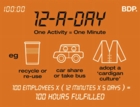Stimulating staff involvement to reduce energy consumption beyond the technical fix

BDP, an interdisciplinary design practice with about a hundred staff in Belfast has been working since 2006 to reduce energy consumption by 20% by 2011. Significant capital and management time had already been invested, but to reach the 2011 target, full staff involvement is required. And it was BDP’s campaign to involve staff that won the award for best carbon-saving programme undertaken by an SME as part of CIBSE’s 100 hours of carbon clean up.
Measurements of carbon consumption before and after the campaign show a 12% reduction in fuel consumption for heating and a 5% reduction in night-time weekly electricity consumption. There was also a reduction in energy consumption of small power appliances, helped by removing desktop fans and encouraging staff to use natural ventilation. A transport survey indicated that 45% of staff travel in private cars, and a transport plan is being developed.
BDP’s campaign was driven by a ’12-a-day’ message — 12 actions a day, averaging one minute per action. With a hundred employees, that amounted to 100 hours in just one week.
The campaign was delivered electronically and reinforced by low-carbon champions. Employees did not have to think about how to be more energy efficient, as numerous suggestions were made.
After the campaign, the results were communicated to all staff, and the low-carbon champions continue to motivate staff.







